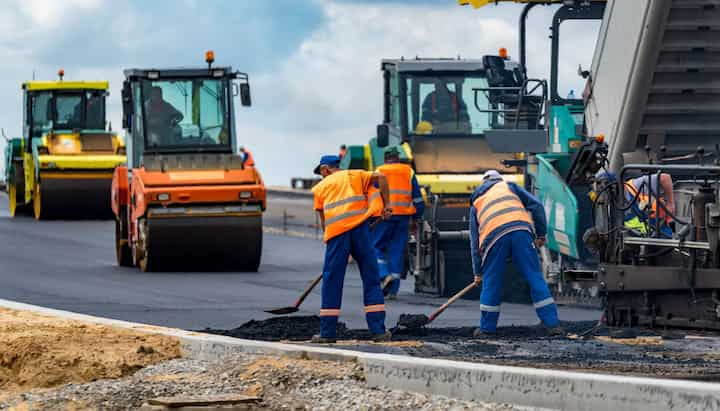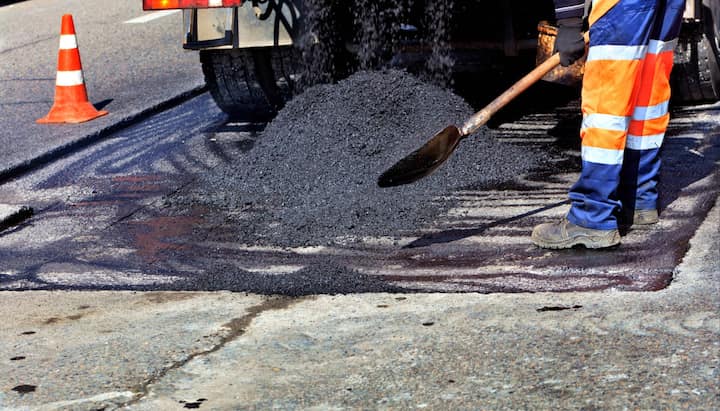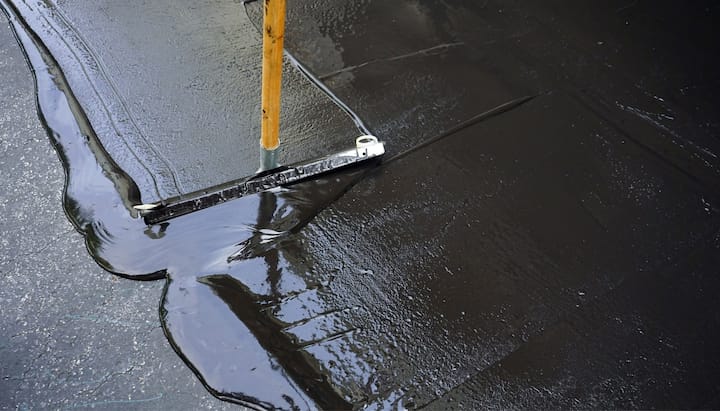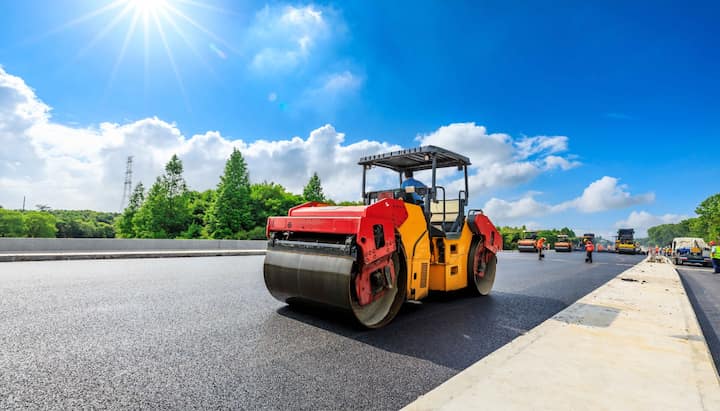Asphalt Contractors You Can Trust in Asheville
Are you tired of cracked, bumpy asphalt that ruins your driveway or parking lot? Look no further than the renowned asphalt contractors of Asheville. Our team of skilled professionals is dedicated to providing exceptional asphalt solutions that meet your specific needs and exceed your expectations.
We understand the importance of durable, long-lasting asphalt surfaces. That’s why we use only the highest-quality materials and adhere to industry best practices to ensure the integrity of our work.
- Driveway Paving and Resurfacing
- Parking Lot Maintenance and Construction
- Crack Filling and Sealcoating
- Asphalt Repairs and Patching
- Asphalt Milling and Removal
We value customer satisfaction above all else. Our team is responsive, professional, and committed to delivering exceptional results. We work closely with you every step of the way to ensure that your asphalt project is completed to your exact specifications.
When you choose the asphalt contractors of Asheville, you can rest assured that you’re getting the best in the business. Contact us today for a free consultation and experience the difference that true expertise can make.

About Us
Looking for Expert Asphalt Paving Contractors in Asheville North Carolina?
As homeowners, we understand the importance of maintaining a strong and durable driveway. Asphalt paving is an excellent option for anyone seeking a reliable and affordable solution. Our team of skilled asphalt contractors possesses the knowledge, expertise, and equipment to deliver exceptional asphalt paving services in Asheville and its surrounding areas. Over the years, we have earned a reputation for providing superior workmanship and customer satisfaction. We meticulously assess each project’s unique requirements, ensuring that our paving solutions align precisely with your specific needs and budget. Whether you require a new asphalt driveway, parking lot, or road repair, we can handle it with professionalism and accuracy. Our unwavering commitment to quality extends to every aspect of our process. We utilize the highest-grade materials, adhering to industry standards and employing advanced paving techniques. Our contractors are equipped with state-of-the-art equipment, ensuring a smooth, level surface with exceptional longevity. Beyond our technical proficiency, we prioritize personalized customer service. We believe in open communication and collaboration, keeping you informed throughout the project. Our team is readily available to address your questions and provide expert advice, ensuring that you make informed decisions regarding your asphalt investment. Choosing us as your asphalt paving contractor guarantees peace of mind. We are fully licensed, insured, and bonded, adhering to the highest ethical and professional standards. Trust our expertise to deliver an asphalt surface that not only enhances your property’s aesthetics but also withstands the inevitable wear and tear of everyday use. Contact us today for a free consultation and let our team of experts transform your paving needs into a seamless, long-lasting reality.
What Is Asphalt?
Asphalt is a mixture that blends binder, filler, and aggregates. Constructors and road maintainers use it for building railway tracks, airport runways, bicycle lanes, parking lots, sports arenas, and sidewalks. Generally, the aggregates used for the mixture include sand, slags, crushed rock, and gravel. However, a few people have recently started adding waste and byproducts to increase the life of the asphalt. The byproducts typically include other construction materials, which vary per company. Experts use a binder to bind the aggregates and turn them into a strong material. While bitumen is a standard binder, Asheville Asphalt Experts of Asheville North Carolina also use bio-based binders to minimize the effect of environmental stressors. A standard asphalt pavement contains bituminous bound materials. This allows the path to distribute the mixture before loads of vehicles arrive on it. Note that pavements do not consist of asphalt alone. Instead, it contains several layers. These may include the subgrade, formation layer, unbound sub-base, unbound-road base, and finally, asphalt layers.
Since When Has Asphalt Been Used As A Construction Material?
Because people have rarely heard about asphalt – not surprising, anyone would be least interested in knowing the materials used in road construction – many assume it’s a relatively newer product. However, it existed as long as the history books. It occurs naturally in asphalt rocks and lakes. The term “asphalt” comes from the Greek “asphaltos.” Literally, the term means something “safe” or “secure.” In ancient times, individuals used this material to seal ships. Besides, the Mesopotamians utilized it to make temple baths and water tanks waterproof. Moving forward, Pharaohs also benefitted from this material. For example, the Egyptians used it along river Nile banks to prevent erosion. Asphalt was also used to build a road in Babylon in 625 BC. Additionally, Romans waterproofed their aqueducts using asphalt. So, the more humans knew about its usage, the more they started utilizing it. Even today, it is used to construct water reservoirs in America. Further, numerous construction companies use it to build and strengthen roads and make pathways smoother and convenient for pedestrians and drivers alike.
Interesting Facts About Asphalt
Asphalt plays a critical role in shaping the sidewalks and driveways. While its quality drastically impacts its performance, all asphalt types serve a common purpose: building and strengthening roads. We’ve enlisted a few exciting facts about asphalt to give you an in-depth understanding of how it works.
- Asphalt is a durable material. However, its durability depends on the aging of the asphalt binder. Generally, the viscosity of asphalt binder increases with time, making it stiffer and reducing its quality.
- Asphalt might result in the flash point. Like most construction materials, asphalt volatilizes at incredibly high temperatures, releasing vapor to increase the volatile concentration resulting in a flash. However, industry experts test and control asphalt to avoid this problem.
- Asphalt gives a smooth appearance to roadways. Besides, if you love riding bikes, expect a comfortable ride on quality asphalt material.
- Roads constructed with top-notch asphalt reduce noise levels.
- Asphalt also benefits airports allowing for safe landings.
- The many advantages of asphalt might make you think it is expensive, but that’s not the case. This material is cost-effective and adds value to driveways and sidewalks.
- The latest asphalt technology ensures better water drainage, reducing muddy and watery paths in the middle of the road.
- Colored asphalt is a thing, and many construction workers use it. However, it is utilized for specific purposes – to alert drivers regarding dangerous areas like sharp edges that might lead to accidents.
Different Types Of Asphalt
Hot Mix Asphalt
Hot asphalt is made at temperatures between 160-180C. Because it is produced at such high temperatures, it won’t be wrong to consider it one of the most durable asphalt mixtures. Therefore, it is ideal for high-traffic areas – think airport runways or highways.
Warm Mix Asphalt
This mix is not made at high temperatures. As such, it requires less energy and fewer fumes. Although it is a safe material for constructors and the environment, it doesn’t provide the type of robustness hot mix asphalt gives. Therefore, it is better for low-traffic paths and light vehicles.
Emulsified Asphalt
This type of asphalt suspends small cement granules into the water, followed by an emulsifying agent – typically soap. They are less viscous than plain asphalt and are ideal for low-temperature areas. After its application, the water evaporates, and the cement is left.
Foamed Asphalt
This is produced by mixing hot asphalt binder in cold water. When the water touches the hot asphalt, it forms steam and traps in the binder bubbles. As such, it produces a high volume yet thin asphalt foam. This foam only lasts for some time, and the binder reshapes into its original form.
Cutback Asphalt
It combines asphalt cement and petroleum solvent. Therefore, it is also less viscous and a better option for low-temperature applications. The petroleum solvent evaporates when the cutback asphalt is applied, and only the cement is left behind. While cutback asphalt is a reliable option, most companies avoid using it for good reasons. First, it is costly. Second, it can be an environmental problem.
Thin Overlays
Thin overlays are an excellent option for improving riding quality and reducing noise levels. It is typically made from recycled materials and warm-mix asphalt.
Porous Asphalt
The history of this asphalt type can be traced back to the 1970s. Construction workers typically use it in parking lots to allow for water drainage. Also, it’s a budget-friendly option and lasts for years to come, which is a plus.
Is Asphalt a Reliable Material?
Yes, asphalt is a sustainable material that provides long-term solutions for road construction. A few pavements alleviate noise pollution while others reduce environmental concerns. Note that asphalt is also a reliable material for the water environment. Unfortunately, a few people assume it isn’t ideal for the water environment because it is soluble and harmful to marine life. However, its use shows that it is safe for all applications. For instance, people have used it in fish hatcheries for several years. Besides, construction workers have also successfully used it for reservoirs of drinking water. Humans drank water from them, and no issues were reported.
Asphalt

Is There An Issue Living By An Asphalt Plant?
Asphalt plants are industrial facilities that produce asphalt for paving roads and other surfaces. While asphalt plants are essential for infrastructure development, they can also have a negative impact on the surrounding environment and residents.
One of the main concerns about living near an asphalt plant is air pollution. Asphalt plants emit a variety of pollutants, including particulate matter, volatile organic compounds (VOCs), and carbon monoxide. These pollutants can contribute to respiratory problems, heart disease, and cancer. In addition, the noise and vibrations from asphalt plants can be disruptive to residents.
Another concern about living near an asphalt plant is the potential for spills and accidents. Asphalt is a hazardous material, and spills can contaminate soil and water. In addition, asphalt plants are often located in industrial areas, which can be dangerous for residents. If you are considering living near an asphalt plant, it is important to be aware of the potential risks and to take steps to protect your health and safety.

Does Asphalt Thickness Matter?
Understanding asphalt thickness is crucial for Asheville residents, contractors, and property owners. Whether installing a new driveway, resurfacing a parking lot, or constructing a major highway, asphalt thickness significantly impacts longevity, performance, and overall durability. Thicker asphalt pavements provide numerous benefits over thinner ones. Increased thickness enhances the structural integrity of the pavement, enabling it to withstand heavier loads and higher traffic volume. This added strength reduces the risk of cracking, buckling, and other surface imperfections, ensuring a smoother and safer driving experience for residents and visitors alike. In areas with extreme weather conditions, thicker asphalt provides better resistance to freeze-thaw cycles and temperature fluctuations, minimizing the likelihood of premature deterioration. Furthermore, the thickness of asphalt affects its noise-dampening properties. Thicker pavements reduce traffic noise, creating a quieter environment for surrounding neighborhoods and improving the quality of life for Asheville residents. Additionally, thicker asphalt acts as an effective barrier against moisture penetration, protecting the underlying soil and preventing water damage that can compromise the pavement’s structural integrity.
Did We Miss Anything?
We are committed to providing exceptional asphalt paving services that transform your outdoor spaces. With years of experience in the asphalt industry, we have honed our skills and acquired the necessary expertise to handle projects of all sizes and complexities. Our team of certified professionals utilizes industry-leading equipment and techniques to ensure that your asphalt pavement is of the highest quality. We meticulously prepare the base, lay down the asphalt, and meticulously seal it to guarantee durability and longevity. From residential driveways and parking lots to commercial roads and industrial installations, we have the experience and capabilities to cater to your specific needs. We understand the importance of timely completion and work diligently to minimize disruption to your daily operations. Our commitment extends beyond the initial installation. We offer comprehensive maintenance services to ensure that your asphalt pavement remains in pristine condition. Regular sealcoating, crack filling, and other preventive measures help protect your investment and prolong its lifespan. We actively seek feedback to identify areas where we can improve our services. Your satisfaction is our top priority, and we strive to exceed your expectations at every turn. If you have any questions or concerns, do not hesitate to reach out to us. Trustus for all your asphalt paving needs. Contact us today for a free consultation and experience the difference that our unwavering commitment to quality and customer satisfaction can make.
Contact Us Today
Professional General Services in Asphalt Asheville
Welcome to Asphalt Asheville’s trusted general service provider. We deliver quality general solutions for residential and commercial customers throughout the Asphalt Asheville area.
Why Choose Our Asphalt Asheville Team
- Experienced, professional technicians
- Quality workmanship guaranteed
- Competitive, transparent pricing
- Licensed and insured
- Excellent customer service
Our Services
We offer comprehensive general services to meet all your needs. From repairs and maintenance to new installations, our Asphalt Asheville team has you covered.
Get Your Free Estimate
Contact us today for a free, no-obligation estimate. We’re ready to help with your general project in Asphalt Asheville.